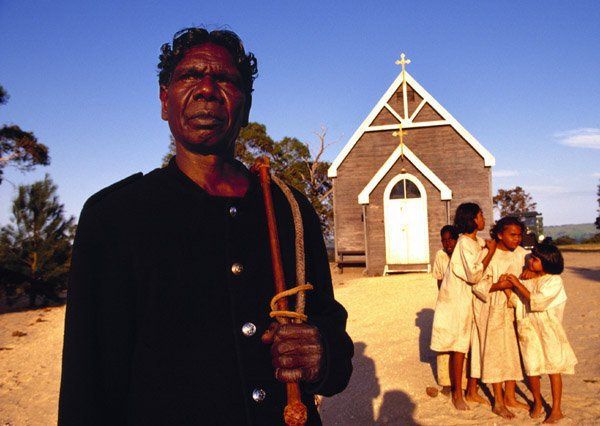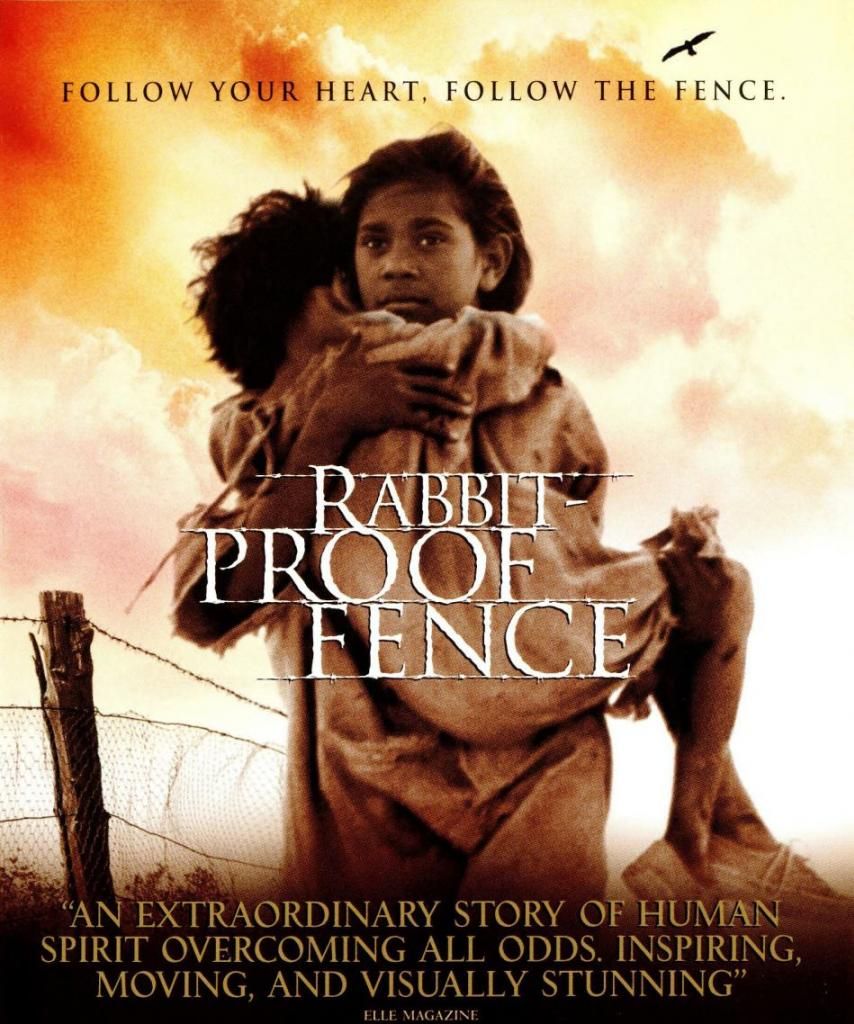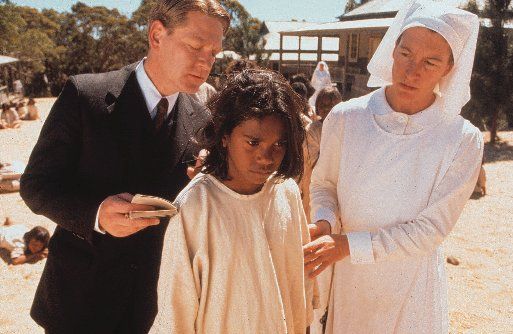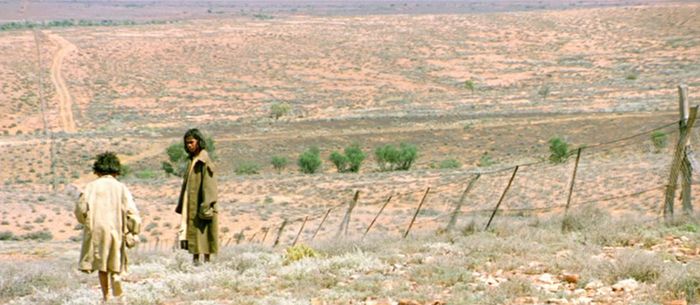Rabbit-Proof
Fence
2002
Director: Phillip Noyce
Starring: Everlyn Sampi, Tianna
Sansbury, Laura Monaghan, Kenneth Branagh
Although
I am by no means an expert on Australian cinema, nor have I seen tons upon tons
of this country’s films, I *will* say that there is a certain sensibility to
many of the films from Australia I’ve seen that I really enjoy. Rabbit-Proof Fence continues in the tradition
of Walkabout,
Picnic at Hanging Rock, The Last Wave, My Brilliant Career, and yes,
even a bit of The Adventures of Priscilla, Queen of the Desert, in terms of
pitting man (or in this case, girls) against nature and drawing on just a hint
of otherworldliness along the way.
Three
“half-caste” (re: half Aboriginal, half white) children, Molly (Sampi), Daisy
(Sansbury), and Gracie (Monaghan), are taken away from their mothers in 1930s
Australia as part of A.O. Neville’s (Branagh) plan to “breed the dark out of
them.” The white population was in total
control of the Aboriginal population and felt it their duty to provide a
traditionally white upbringing to these “half-caste” children. Molly, though, is having none of it; she is a
clever girl, and escapes the settlement in order to return to her mother,
bringing her sister and cousin with her.
This involves a journey of 1200 miles on foot, following the eponymous
fence, which runs for thousands of miles across Australia back to Molly’s
mother’s home.
The
tension of this film is based on racial prejudices: the whites have cordoned
off the Aborigines. This theme has been
seen too many times around the world, but here in the States, we don’t hear
about many of these tales as often as we should. We only vaguely know about the struggles of
the indigenous peoples in Australia; it’s good to see a movie like Rabbit-Proof
Fence in order to be made more aware.
Although the concept of “The Stolen Generation” is still apparently
debated in Australia (by conservatives, so take that for what you will), what
is not up for debate is the racial prejudice behind such an idea. Watching Molly, Daisy, and Gracie being
ripped from the arms of their mothers at the opening of film is rough.
Given
that racial prejudices lead to such vile hatred, what sets the prejudices in Rabbit-Proof
Fence apart is the lack of outright hatred we see on the screen. This is personified by Branagh’s portrayal of
Neville, the man responsible for the concept of separating children from their
parents in order to “raise them correctly.”
Neville is clearly the chief antagonist, the man who plots and schemes
to keep the girls in their settlement and away from their mothers. But he is also completely convinced that he
is acting in the girls’ best interest by doing so. Here is a man so utterly committed to his
ideology that he honestly does not realize how morally reprehensible it
is. It’s interesting, then; Neville is
not so much hateful as he has an awful case of tunnel-vision. It’s rather like Tommy Lee Jones’ character
in The
Fugitive – not chasing Harrison Ford because he hates him, but because
it is his job, it is what he is supposed to do.
This is mirrored by the nurse at the settlement: she is stern, but also
a little kind. She honestly thinks she
is helping these children. It’s an interesting
concept of evil.
Necessarily
filmed mostly in exteriors, we get lovely, awesome, sweeping landscapes of
Australia throughout the film. Very few
scenes are indoors – in fact, most of the indoor scenes are those involving
Neville. This lends his character a kind
of claustrophobia, underlining how unaware or insensitive he is of the larger
world around him. Furthermore, what’s
nice about the scenery in Rabbit-Proof Fence is that the
exteriors are varied. It’s not simply
barren red desert for every scene. The
girls are making a voyage of over 1200 miles; naturally, their landscape would
alter along the way.
The
soundtrack to Rabbit-Proof Fence is very good, and one that I noticed right
away in my first viewing. Peter Gabriel
composed it, but he doesn’t go hog wild synthesizer cheesetastic (as he is
sometimes wont to do). There’s a
restraint that builds a haunting sense of isolation. Naturally he uses many native Australian
instruments (take a shot every time you hear a didgeridoo), and he can’t help
but sneak some synthesizer in there a little, but he focuses on
percussion. The beats, the rhythms are
the important aspects in this score, not a melodic theme. The score provides the heartbeat of the film.
 |
| He's one badass mofo. |
I
smiled so broadly when David Gulpilil first appeared onscreen. Given that I like many of the Australian
films I’ve seen, and referring to those specifically mentioned in my opening
paragraph, casting Gulpilil is not only awesome, but it feels right, almost
necessary. Gulpilil, in all his
awesomeness, plays Moodoo, the crackerjack tracker Neville sets on the
girls. Moodoo never fails to return a
runaway, and he can read the landscape like a pro. Molly knows this, and she is immensely clever
in her planning and her trek; she must be, in order to outwit Moodoo. What I found enjoyable was watching Moodoo’s
respect for his prey grow throughout the film.
Indeed, in some scenes, I was uncertain whether or not Moodoo knew
exactly where the girls were, but refused to say. Gulpilil is an actor whose performance comes
from his presence rather than his words.
He can be a bit stilted reciting dialogue, but he’s awesome with
piercing stares and otherworldly charisma.
In the making-of documentary on the DVD, the three girls who played the
leads were shown Walkabout prior to their meeting Gulpilil (I wonder if they
were shown the end). There is a sense,
especially if you consider Walkabout, of the torch being passed
between generations of Aboriginal actors.
Ultimately,
though, Rabbit-Proof Fence is a tense and dramatic film that makes for
good watching. It easily pulled me in
and got me emotionally invested in the plight of these girls. Cracking good yarn!
Arbitrary
Rating: 8/10



I found this one pretty moving, too. Nice observation about the Branagh character--he's sort of the living embodiment of the road to Hell being paved with good intentions.
ReplyDeleteAnd yeah, David Gulpilil is one of those actors who always makes me smile a little bit.
Thanks. And YES, definitely agreed re: road to Hell. I was amazed by how little I dislike Neville in this movie; rather, I wanted him to realize how destructive he was being. He feels like a character that has the possibility being "converted," so to speak, to the "good side," he just needs a major awakening.
DeleteThis was one I was surprised I hadn't seen earlier. I don't know why but for some reason I didn't think I would like it - I honestly have no idea where that came from. But it was gripping and moving and entertaining.
I was also going to use the good intentions quote (great minds, etc.)
ReplyDeleteGood review. I remember seeing a film years ago that was titled Oranges Are Not the Only Fruit. A daughter of a very religious family figures out she is a lesbian. As you can imagine, this doesn't go over well with her parents, but their reaction, and the actions they take to "rid her" of this curse, are made even more frightening by the fact that they are doing it out of their concept of love and saving her from being damned forever. The woman who wrote the script was basically doing an autobiography.
Definitely sounds like a film from the same vein - crazy distorted love rather than out-and-out hatred. Thanks for the mention of it - I've never even heard of it.
Deletejordan shoes
ReplyDeletemichael kors handbags
skechers shoes
yeezy boost 350
links of london
louboutin shoes
longchamp handbags
michael kors handbags
nike polo shirts
chrome hearts
The perimeter now measures 113' x 186'. I am also expanding the are under tillage and it should be 1/3 acre by the time I am done.bamboo fencing
ReplyDeletekyrie irving shoes
ReplyDeletecanada goose
converse shoes
ferragamo belt
nike air max 97
michael jordan shoes
air force 1
chrome hearts online store
timberland boots
curry 5 shoes